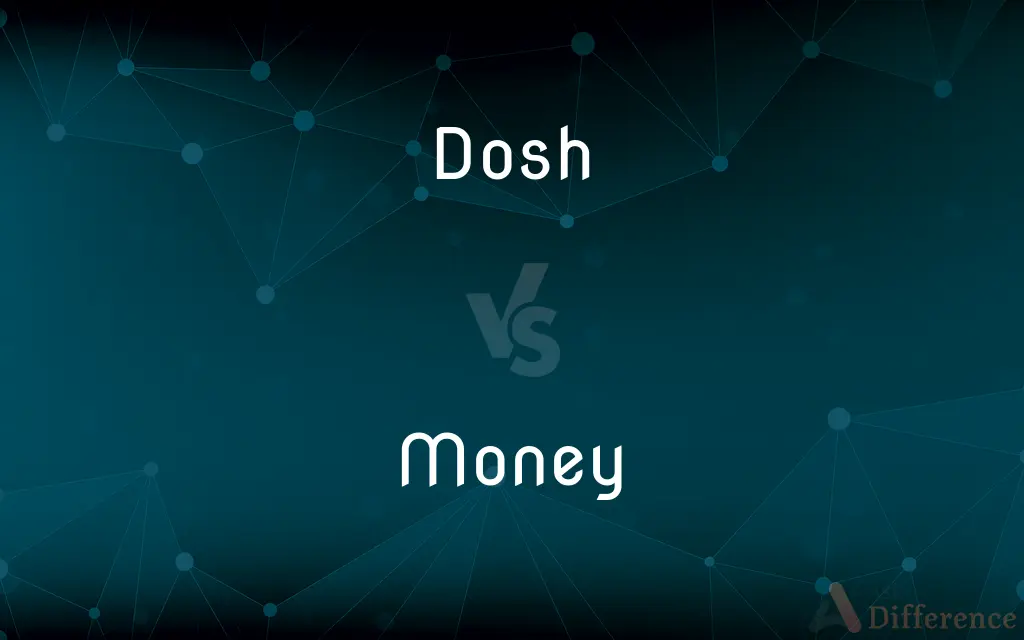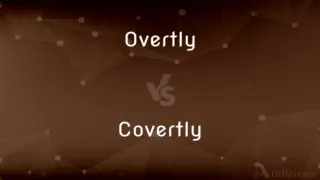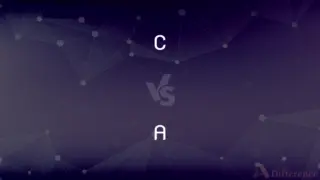Dosh vs. Money — What's the Difference?
By Urooj Arif & Fiza Rafique — Updated on April 4, 2024
Dosh generally refers to money in informal British English, emphasizing its slang nature, while money is a universally recognized medium of exchange for goods and services.

Difference Between Dosh and Money
Table of Contents
ADVERTISEMENT
Key Differences
Dosh is a slang term predominantly used in the UK to refer to money, highlighting a casual or informal context. Whereas, money is a formal term used globally to denote any official currency or medium of exchange used in transactions for goods and services. This distinction points to dosh being more colloquial, and its use might be limited to certain social settings or conversational tones.
Dosh often carries a lighter, more playful connotation, suggesting a less formal attitude towards financial discussions. On the other hand, the term money is neutral and can be used in both formal and informal settings, including financial reports, news broadcasts, and everyday conversations. This versatility makes money a universally understood term, whereas dosh might require some cultural context to be fully comprehended.
While dosh is understood and used within certain English-speaking communities, especially within the UK, its recognition and understanding are not global. Conversely, money is a term recognized and utilized worldwide, crossing cultural and linguistic barriers. This global recognition ensures that money can be discussed and understood in a wide variety of contexts, from international business negotiations to travel.
In literature and media, dosh may be used to convey a character’s nationality, socioeconomic background, or to add a touch of local color to dialogues. Money, however, is used more broadly and can be found in almost any context, from the highest literary works to daily newspapers, reflecting its universal application.
The use of dosh in digital and social media is often seen in a more lighthearted or humorous context, indicating a casual conversation about finances. Money, due to its neutrality, is used across all types of digital communication, including more serious discussions about economics, finance, and global markets. This demonstrates the adaptability of the term money in various forms of communication, in contrast to the more niche application of dosh.
ADVERTISEMENT
Comparison Chart
Definition
Slang term for money in the UK.
Official medium of exchange for transactions.
Connotation
Casual, informal.
Neutral, formal.
Global Recognition
Recognized mainly in the UK and some English-speaking countries.
Universally recognized and understood.
Use in Communication
Predominantly in casual, informal settings.
Across both formal and informal contexts.
Cultural Context
British slang, used within specific communities.
Used globally, without specific cultural connotations.
Compare with Definitions
Dosh
Slang for money, particularly in British English.
I need to earn some dosh this summer.
Money
Legal medium of exchange, currency.
I need to withdraw some money from the bank.
Dosh
Informal term indicating cash.
Could you lend me some dosh for the taxi?
Money
A term for financial resources or capital.
Investing money wisely is key to wealth.
Dosh
Casual term for currency in everyday conversations.
We pooled our dosh to buy the gift.
Money
Universal unit of account for transactions.
The total amount of money owed is $100.
Dosh
A playful word for funds or capital.
She's saving her dosh for a holiday.
Money
Symbol of economic value in trade.
They donated a significant amount of money to charity.
Dosh
Colloquial expression for financial resources.
He's got loads of dosh from his new job.
Money
General term for cash, coins, and banknotes.
He found some money in his coat pocket.
Dosh
Money.
I'd like to buy a new car, but I'm short on dosh.
Money
Money is any item or verifiable record that is generally accepted as payment for goods and services and repayment of debts, such as taxes, in a particular country or socio-economic context. The main functions of money are distinguished as: a medium of exchange, a unit of account, a store of value and sometimes, a standard of deferred payment.
Money
A medium that can be exchanged for goods and services and is used as a measure of their values on the market, including among its forms a commodity such as gold, an officially issued coin or note, or a deposit in a checking account or other readily liquefiable account.
Money
The official currency, coins, and negotiable paper notes issued by a government.
Money
Assets and property considered in terms of monetary value; wealth.
Money
Pecuniary profit or loss
He made money on the sale of his properties.
Money
One's salary; pay
It was a terrible job, but the money was good.
Money
An amount of cash or credit
Raised the money for the new playground.
Money
Often moneys, monies Sums of money, especially of a specified nature
State tax moneys.
Monies set aside for research and development.
Money
A wealthy person, family, or group
To come from old money.
To marry into money.
Money
A legally or socially binding conceptual contract of entitlement to wealth, void of intrinsic value, payable for all debts and taxes, and regulated in supply.
Money
A generally accepted means of exchange and measure of value.
I cannot take money, that I did not work for.
Before colonial times cowry shells imported from Mauritius were used as money in Western Africa.
Money
A currency maintained by a state or other entity which can guarantee its value (such as a monetary union).
Money supply;
Money market
Money
Hard cash in the form of banknotes and coins, as opposed to cheques/checks, credit cards, or credit more generally.
Money
The total value of liquid assets available for an individual or other economic unit, such as cash and bank deposits.
Money
Wealth; a person, family or class that possesses wealth
Money
An item of value between two or more parties used for the exchange of goods or services.
Money
A person who funds an operation.
Money
A piece of metal, as gold, silver, copper, etc., coined, or stamped, and issued by the sovereign authority as a medium of exchange in financial transactions between citizens and with government; also, any number of such pieces; coin.
To prevent such abuses, . . . it has been found necessary . . . to affix a public stamp upon certain quantities of such particular metals, as were in those countries commonly made use of to purchase goods. Hence the origin of coined money, and of those public offices called mints.
Money
Any written or stamped promise, certificate, or order, as a government note, a bank note, a certificate of deposit, etc., which is payable in standard coined money and is lawfully current in lieu of it; in a comprehensive sense, any currency usually and lawfully employed in buying and selling.
Money
Any article used as a medium of payment in financial transactions, such as checks drawn on checking accounts.
Money
Any form of wealth which affects a person's propensity to spend, such as checking accounts or time deposits in banks, credit accounts, letters of credit, etc. Various aggregates of money in different forms are given different names, such as M-1, the total sum of all currency in circulation plus all money in demand deposit accounts (checking accounts).
Money
In general, wealth; property; as, he has much money in land, or in stocks; to make, or lose, money.
The love of money is a root of all kinds of evil.
Money
To supply with money.
Money
The most common medium of exchange; functions as legal tender;
We tried to collect the money he owed us
Money
Wealth reckoned in terms of money;
All his money is in real estate
Money
The official currency issued by a government or national bank;
He changed his money into francs
Common Curiosities
What is dosh?
Dosh is British slang for money, used informally.
How is dosh different from money?
Dosh is a slang term with casual connotations, whereas money is a formal and universally recognized term.
Can dosh be used in formal financial contexts?
No, dosh is considered too informal for official financial documents or discussions.
Is the term dosh understood outside the UK?
Its understanding may be limited outside the UK, requiring some cultural context.
Is it appropriate to use dosh in professional settings?
Typically, no. It's best to use the term money in professional or formal settings.
Where is dosh commonly used?
Dosh is commonly used in casual conversations within the UK and some other English-speaking regions.
Can the term money be used in all contexts?
Yes, money can be used in both formal and informal contexts universally.
How did dosh come to mean money?
Dosh likely originated as British slang, with its exact origins unclear but rooted in informal language.
What does money refer to?
Money refers to any official currency or medium of exchange for goods and services.
Are there similar slang terms for money in other cultures?
Yes, many cultures have their own slang terms for money, reflecting local language and attitudes.
Is it important to know local slang like dosh when traveling?
While not essential, understanding local slang can enhance cultural experiences and social interactions.
Do dosh and money have the same value?
Yes, in contexts where dosh is understood, it represents the same value as money.
Why might someone use the term dosh instead of money?
To convey a more casual, light-hearted tone, or to reflect local slang.
Can using dosh in international contexts lead to confusion?
Potentially, as the term may not be universally recognized or understood.
Is dosh a recognized currency?
No, dosh is not an official currency but slang for money.
Share Your Discovery

Previous Comparison
Overtly vs. Covertly
Next Comparison
C vs. AAuthor Spotlight
Written by
Urooj ArifUrooj is a skilled content writer at Ask Difference, known for her exceptional ability to simplify complex topics into engaging and informative content. With a passion for research and a flair for clear, concise writing, she consistently delivers articles that resonate with our diverse audience.
Co-written by
Fiza RafiqueFiza Rafique is a skilled content writer at AskDifference.com, where she meticulously refines and enhances written pieces. Drawing from her vast editorial expertise, Fiza ensures clarity, accuracy, and precision in every article. Passionate about language, she continually seeks to elevate the quality of content for readers worldwide.













































